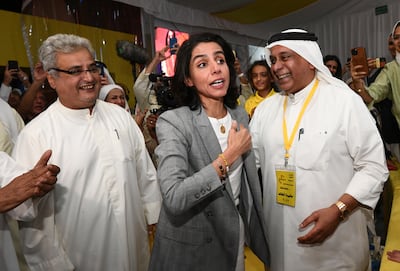Kuwait has restructured the government headed by Sheikh Ahmed Nawaf Al Sabah after several recently-elected members of parliament refused to attend the opening session of parliament in protest over the Cabinet formation.
Kuwait appointed Bader al Mulla as its new oil minister, the Ministry of Information in the Gulf country said on Sunday. The royal decree to form the government also included appointing Abdulawahab Al Rushaid as finance minister and Sheikh Salem Al Sabah as foreign minister.
Sheikh Ahmed was recently appointed as prime minister and announced his Cabinet of ministers following snap elections. Upon announcing his Cabinet last week, several MPs, including an appointed minister, rejected the formation.
Ammar Al Ajmi was also appointed as Minister of State for National Assembly Affairs and Minister of State for Housing and Urban Development. Mr Al Ajmi was appointed last week as Minister of Public Works and Electricity but rejected the position in protest over the appointment of several incumbent ministers.

The appointment of Sheikh Salem Al Sabah means Sheikh Ahmed Nasser Al Sabah has been ousted as foreign minister. Sheikh Ahmed faced a turbulent time in office after surviving a vote of no confidence in February. MPs filed a motion to investigate alleged financial irregularities in his department while he was in office.
The Kuwaiti government was forced to postpone the first session of its newly elected parliament until October 18. Constitutionally, parliament must hold its opening session two weeks following its election. MPs attempted to gather on Sunday but 10 MPs did not attend in protest.
Kuwait held early elections on September 29 after Crown Prince Sheikh Meshaal dissolved parliament in an attempt to end a political stand-off between the government and the legislature that has hindered fiscal reforms.
The crown prince said Kuwait’s leadership would rely on the people to elect a parliament after the previous assembly adopted “practices and behaviours that threaten national unity".
Who is in Kuwait's new Cabinet?
— First Deputy Prime Minister and Interior Minister Talal Khaled Al Ahmad Al Sabah
— Deputy Prime Minister and Minister of State for Cabinet Affairs Barrak Ali Al Shaitan
— Deputy Prime Minister and Oil Minister Dr Bader Hamed Al Mullah
— Minister of Public works and Minister of Electricity, Water and Renewable Energy Amani Suleiman Bu Qamaz
— Minister of Information and Minister of State for Youth Affairs Abdulrahman Bedah Al Mutairi
— Minister of Finance, Minister of State for Economic and Investment Affairs Abdulawahab Mohammad Al Rushaid
— Minister of Health Dr Ahmad Abdulwahab Al Awadhi
— Minister of Foreign Affairs Salem Abdullah Al Jaber Al Sabah
— Minister of State of National Assembly Affairs and Minister of State for Housing and Urban Ammar Al Ajmi
— Minister of Defence Abdullah Ali Abdullah Al Salem Al Sabah
— Minister of State for Municipal Affairs Adulaziz Waleed Al Mujil
— Minister of Commerce and Industry and Minister of State for Communication and Information Technology Mazen Saad Al Nahidh
— Minister of Education and Minister of Higher Education and Scientific Research Dr. Hamad Abdulwahab Al Adwani
— Minister of Justice and Minister of Endowments and Islamic Affairs and Minister of State for Nazaha Enhancement Abdulaziz Majed Al Majed
— Minister of Social Affairs and Societal Development and Minister of State for Women and Childhood Affairs Mai Jassim Al Baghli


